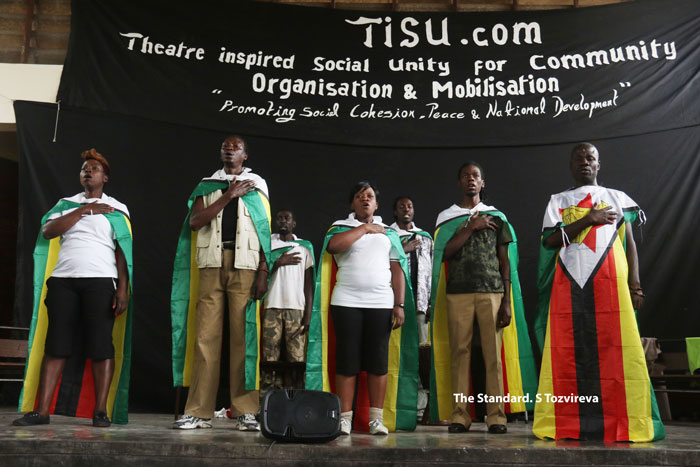
In just 46 minutes, I laughed, cried, got angry, and became confused as the actors staged the theatre play, After Flashbacks and Setbacks.
BY TAPIWA ZIVIRA
Each minute and each scene provided its own emotion as the actors gave a visual, graphic presentation of Zimbabwe’s long, painful attempts to heal itself after decades of different forms of traumatising events.
Staged by some of the best theatre practitioners in the country, After Flashbacks and Setbacks brings to the spotlight some of the most contentious issues in Zimbabwe, which include the 1980s Gukurahundi massacres that left over 20 000 people dead in Matabeleland and Midlands provinces after the then Prime Minister Robert Mugabe unleashed the North-Korean-trained Fifth Brigade to the region in one of the country’s darkest moments.
In addition to Gukurahundi, the play weaves perfectly issues that include the trauma suffered during the liberation struggle, both by the fighters and the general population, the land reform exercise, the recurrent political violence, State-sponsored human rights violations, Operation Murambatsvina, and the economic distress that Zimbabweans have suffered as a result of Mugabe’s disastrous economic policies.
Throughout the play, the audience is kept captive as the cast skilfully characterise different experiences and emotions that Zimbabweans have gone through during the various incidences.
- Chamisa under fire over US$120K donation
- Mavhunga puts DeMbare into Chibuku quarterfinals
- Pension funds bet on Cabora Bassa oilfields
- Councils defy govt fire tender directive
Keep Reading
In one sad scene, a woman whose daughter was raped and murdered during Gukurahundi laments the loss in tears and the cruelty of the incident is shown when two characters ruthlessly descend on an innocent young girl, rape and kill her.
In another scene, which exposes the State security sector’s hand in suppression of the students’ movement and the government’s inclination to use the West as a scapegoat for its failures, a student protester, in exchange for freedom, is forced to confess to being funded by a Western non-governmental organisation to destabilise the government.
Synonymous with any piece of art, the play has its lighter moments of song and dance that leaves audiences singing and dancing along.
There is also a blend of soft and fast-paced beats that vary from kongonya to jazzy and Afro fusion rhythms.
The cast does a good job in providing the needed humour, both in the way they dress and the way they speak and show emotions.
While taking the audience through the complex flashbacks and setbacks in Zimbabwe’s long road to healing and reconciliation, the play also focuses on the inadequacy of the recently promulgated National Peace and Reconciliation Commission (NPRC) to efffectively deal with the healing and reconciliation process.
The play exposes some of the commission’s weaknesses, among them the lack of independence from the parent ministry, and that the current government — which is accused of a litany of human rights abuse allegations — is a key player in the NRPC process.
As the actors spell these weaknesses, the audience is left in temporary confusion over the seemingly slim chance of Zimbabwe ever conducting a peaceful, successful healing process given that the NPRC Bill appears not to promote truth-telling, a key aspect in any healing process.
But as it ends, the solution is spelt out, unity, truth and realisation that we are all Zimbabweans, and it is upon us all to take into our hands the healing of our nation.
The play is performed by Edzai Isu Theatre Arts Project through its community theatre initiative, Tisu.com, in partnership with Heal Zimbabwe Trust.
It features talented theatre practitioners who include director and producer Tafadzwa Muzondo, choreographer Gibson Sarari and poet Mbizo Chirasha, Brezhnev Guveya, Julius Julius, Livius Chitsungo, Charlotte Munyanyi, Samantha Ndlovu and Charles Biniweri.
“After Flashbacks and Setbacks is a powerful fusion of drama, dance, poetry and music looking beyond the flashbacks and setbacks, emotions and frustrations, individual interests and political resistance, questions and suggestions, thus establishing a live platform where people determine what healing and reconciliation means to them, considering their particular circumstances,” said Muzondo.














